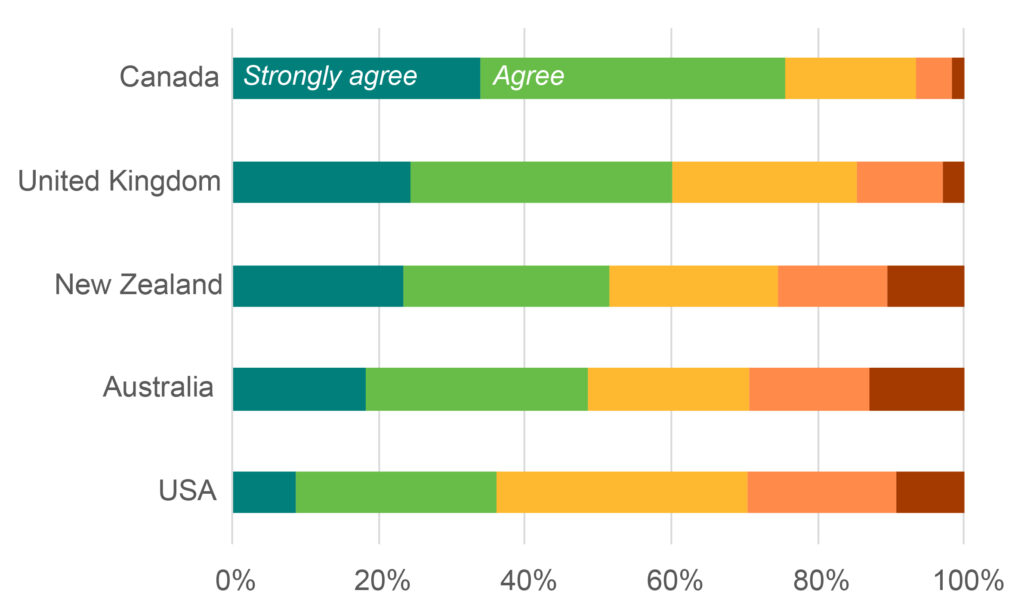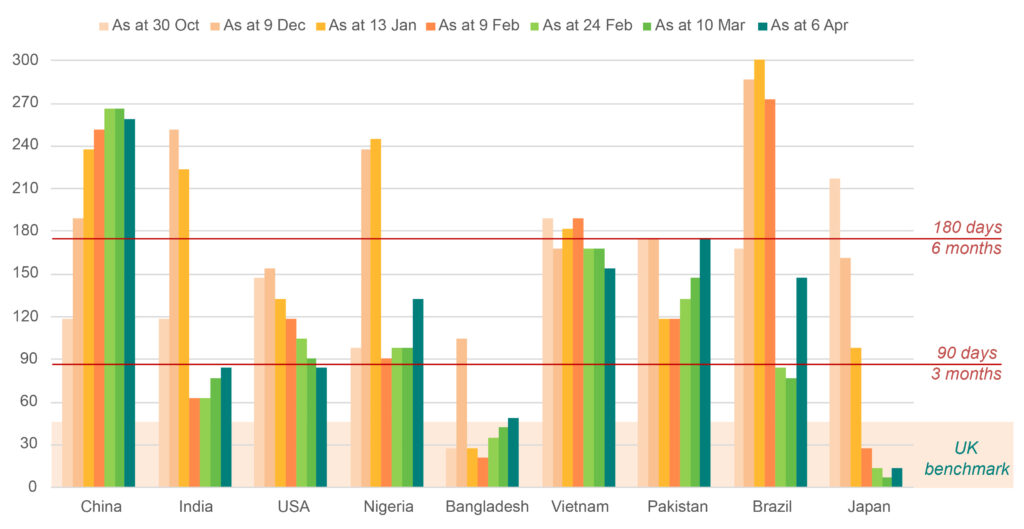
Canada poised for a potential surge in international students
The third (and most recent) round of Navitas Agent Perception Research in March 2021 is the most comprehensive to date, capturing the views and opinions of nearly 900 agents in 73 countries around the world on the impact of COVID-19 on international education.
Canada is currently the most attractive study destination underpinned by a strong government policy response to COVID-19
In the latest Navitas agent research, International education agents have provided a ringing endorsement of the Canadian response to COVID-19 with Canada holding a commanding lead ahead of the start of the 2021 academic year.
In terms of general sentiment, a substantial 63% of agents rated Canada as “Very Attractive”. This is well ahead of the UK and Australia at 51% and 49% respectively.
In terms of the various contributing factors, three-quarters of agents agreed that the Canadian government’s handling of the coronavirus had made it a more attractive study destination. From a purely public health point of view, some might consider this to be somewhat of a surprise. While the Canadian government certainly performed better than either the UK or USA in the early months of the pandemic, its vaccination program has faced challenges in recent months.
However, it is much less of a surprise when considering specific measures that have been put in place for international students.In this domain, the government’s response has been near faultless. Both its policies and its messaging to international students hit all the right notes. In particular, it allowed existing permit holders to travel into the country after borders were closed, it provided international students with access to the Canada Emergency Response Benefit (CERB), and it communicated openly and positively to international students and their families throughout.
More recently the Canadian government has announced temporary changes to its Post Graduate Work Permits Program (PGWP) to extend eligibility for a PGWP to international students who need to complete their studies online from abroad. After the survey was in the field, the Canadian government issued an invitation for 40,000 graduates to put down roots in Canada – such significant policy measures provide continuous reinforcement for Canada’s favourable views towards international students throughout the pandemic, recognising them as valuable contributors to the country’s social and economic fabric.
Figure 1.1: Over the past two months, the way this country’s government has handled coronavirus has made it a more attractive study destination
The Canadian Context
International students are a core part of the post-secondary education landscape in Canada
As recently reported by Statistics Canada, international students accounted for all of the growth in postsecondary enrolments in 2018/19. In many critical fields of study, international students now make up a large proportion of the student body, including one-third of enrolments in Mathematics, Computer and Information Sciences.
Statistics Canada has projected that Canadian universities could possibly lose between $377 million and $3.4 billion (or 7.5% of projected revenues) in 2020/2021, depending on the size of the reduction in international student enrolments and the subsequent loss in tuition fees. These dire forecasts were based primarily on the level of student permit processing in late 2020.
Visa processing is undermining the positive sentiment towards Canada
Visa processing turned out to be the tourniquet on Canada’s firehose; demand from international students was strong but lengthy delays to get a visa meant that the number of new students starting in the fall intake for 2020 was much weaker than anticipated. The volume of study permits issued in 2020 was 36 per cent lower than the number issued in 2019. This appears to be a direct result of IRCC having processed 48% fewer study permit applications over the course of the year.
Canada was not alone in seeing a major disruption to visa processing – Australia and the UK both also shutdown visa processing entirely early in 2020. The difference was that both countries were able to reopen, deal with the backlog, and get back to pre-pandemic processing turnaround times. In contrast, Canada is still reporting an estimated wait time of 38 weeks for study permit applicants in China and 21 weeks for applicants in Vietnam.
Visa processing is not the most important part of the international student journey, but it is one of the most daunting. Complex and onerous documentation requirements, lengthy and variable wait times, opaque assessment considerations, and unpredictable results in terms of a visa being granted or rejected – all of these make the process seem highly uncertain for individuals trying to plan for a major life event.
Figure 1.2: Estimated visa processing times according to Canada.ca
Source: https://www.canada.ca/en/immigration-refugees-citizenship/services/application/check-processing-times.html
Canada leads the way on both safety and openness
Navitas has been tracking agent sentiments on the twin dimensions of ‘safe and stable’ and ‘open and welcoming’ since the start of the pandemic. For the first time, Canada leads on both dimensions.
In 2020, countries either led on being ‘safe and stable’ (New Zealand, Australia) or on being ‘open and welcoming’ (the UK). In 2021, Canada has achieved a surprising and commanding position being number one on both safety (79% agree) and openness (76% agree). Of the major anglophone destinations, no other country comes close to achieving this result, with the UK in a distant second place (with 58% and 74% respectively).
As discussed previously, Canada has led the way in its policy response to international students during the pandemic. Canada has continually demonstrated its inclusivity through a range of support measures targeted at international students affected by the virus (including additional work rights and access to unemployment benefits). Its reopening of borders to international students in October last year and subsequent announcements regarding extensions to post-study work rights and vaccines for international students have only strengthened its reputation.
Figure 1.3: Proportion that agree/strongly agree that the reputation of a country as ‘safe and stable’ and ‘open and welcoming’ has improved in the last two months
A few obstacles remain in the way of a significant surge in international student commencements in Canada in 2021
The agent survey provides compelling evidence that student interest in Canada remains strong. There is a good chance that many students who could not commence last Fall simply deferred for a year and will be looking to try again in 2021. Similar to the Ontario double cohort of 2003, there is the potential for Canada to see a significant surge in international student applications in 2021. The potential to overshoot pre-pandemic demand would be driven by those students who deferred from last year, and possibly some displaced students unable to fulfil their plans to study in Australia and New Zealand.
However, Canada’s window of opportunity to realise such a surge is closing fast. Unlike other exports, international education is very much time sensitive with the vast majority of post-secondary students commencing their programs in the Fall. Unlike Australia which has two entry points into the academic calendar in February and June, everything hinges on September in Canada. And September is less than six months away.
Most international students will need at least 3 to 6 months to make their necessary plans. There are three reasons why Canada may miss this window of opportunity.
First, the vaccine rollout has improved but may not progress quickly enough for the public health officials and politicians to adopt an open borders stance in the next few months. From a public health perspective, Canada is doing well, but the timing of borders being re-opened is uncertain. By contrast, the UK has explicitly committed to a roadmap that includes removing all social distancing requirements by 21 July – the resumption of international travel is also on the cards.
Second, visa processing times seem to indicate that Canada is not yet able to cope with the volumes of applications coming through, which will be exacerbated if the surge from pent-up demand does come. Until a study permit is granted, international students will remain prudently uncommitted, and continue to hedge their bets with applications to other prospective destinations.
Third, there will be long queues around flights and mandatory quarantine. Closed borders, partial or otherwise, will continue to limit the air travel options for students that want to study in Canada in the Fall. Mandatory quarantine will similarly create a bottleneck for student arrivals. It is important to consider that there is already a queue of students who had either commenced their studies pre-pandemic or commenced with online study in the last 12 months waiting to enter the country.
If Canada doesn’t have all its ducks in a row in time for the September 2021 intake, some students may be committed enough to contemplate a start online before transitioning to face to face. But many students could also consider other study destinations, particularly the United Kingdom.
Read the Executive Summary and download the Navitas Agent Perception Report here.






